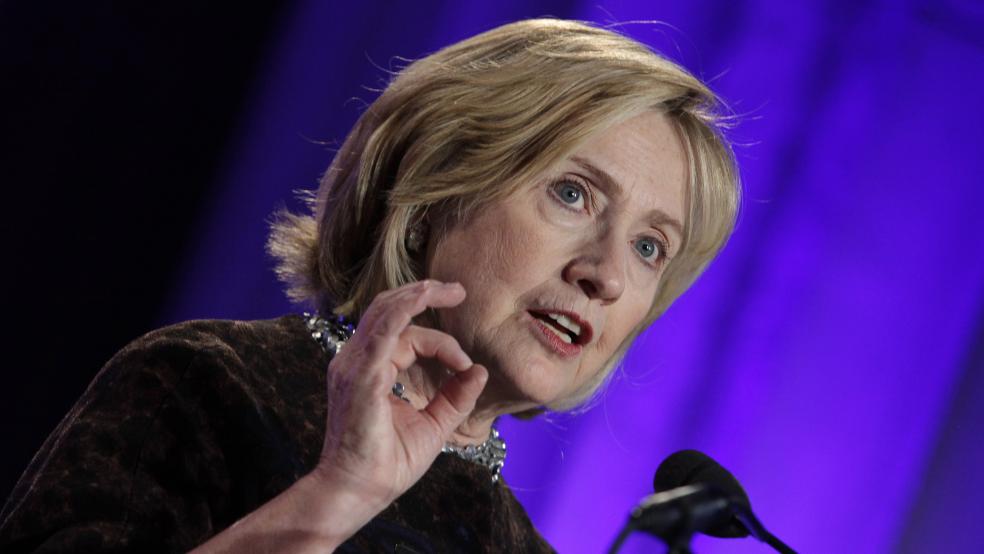At first, too little money was the issue. Now, it’s too much. By claiming to have struggled with financial concerns after leaving the White House, and later backtracking, Hillary Clinton has driven a storyline about her wealth and has raised questions about whether or not being perceived as rich could impact a potential run at the presidency in 2016.
“We came out of the White House not only dead broke, but in debt,” Clinton told Diane Sawyer of ABC News earlier this month, in defending her current speaking fees. “We had no money when we got there, and we struggled to, you know, piece together the resources for mortgages, for houses, for Chelsea’s education. You know, it was not easy.”
Related: How About This 2016 Matchup? Clinton vs. Romney
With that, the money issue was out there, along with plenty of “poor Hillary” antipathy. “The storyline that has come out, which is not one that she wanted to focus on, is whether she’s someone who is out of touch,” Princeton University Professor of History and Public Affairs Julian Zelizer said. “Someone who is wealthy as a result of her service in various government positions that she can’t really understand the economic hardship of most Americans.”
In an interview with British newspaper The Guardian published this weekend, Clinton was asked whether her wealth — her “huge personal wealth,” as the paper put it — would undermine her credibility when addressing income inequality. In response, the multimillionaire Clinton tried to contrast her financial situation with those further up the ladder: “[w]e pay ordinary income tax, unlike a lot of people who are truly well off, not to name names; and we’ve done it through the dint of hard work.”
The money questions, and those types of answers, now have some Democrats worried that the issue could undermine Clinton’s middle-class appeal and that Clinton’s jet-setting lifestyle could be “a potentially serious political problem” for a 2016 run, as The Washington Post reported Monday.
So just how much money do the Clintons have? It’s true that the couple left the White House with as much as $10 million in debt and far less in the way of assets. A year later, Bill Clinton made $13 million in speaking engagements and Hillary earned an advance for her first memoir that totaled $8 million. Their debt was erased by 2004 and tax returns from the 2008 campaign showed that they earned $109 million over eight years.
The Clintons have earned millions more since then. Hillary Clinton’s last federal financial disclosure filing (PDF), covering 2012, shows that Bill Clinton made more than $16 million that year in speaking fees, including $700,000 for a speech in Lagos, Nigeria, and $400,000 or more for numerous other speeches. (The former president also continues to receive retirement benefits and other perks from the federal government, including more than $900,000 in fiscal 2014 for his offices, staff and pension. In all, The Washington Post reported, he has gotten nearly $16 million in such benefits since leaving office.)
As of 2012, the Center for Responsive Politics estimated Hillary Clinton’s net worth at between $5.2 and $25.5 million. And Hillary has flexed her own earning power since leaving her position as Secretary of State in February 2013. She has made some 90 speeches, at least two dozen of which were paid, according to Mother Jones. With her usual fee reported to be north of $200,000 per speech, the magazine estimated that Clinton made nearly $5 million for speeches and appearances in the last 15 months.
Zelizer explained that the question – regardless of fairness or accuracy – has been raised of whether Hillary is the Democratic version of Mitt Romney, who was criticized for being out of touch with average Americans. (Romney, by the way, reported $13.7 million in total income on his 2011 tax return.)
“I think politicians can overcome this,” Zelizer said. “It’s become the storyline in recent years. The advantage that Hillary Clinton has over Mitt Romney is that Democratic policy tends to be more favorable to middle class Americans. In some ways, she can say, ‘This isn’t really the story. The story is what I’m going to do.’”
Clintons’ stumbles in addressing the financial questions, then, suggest that there’s an even more important question she’ll have to answer. “It is important that people identify with (politicians), but I don’t think it’s about how much money you have or where you come from,” Zelizer said. “The challenge for Hillary Clinton – and it always has been – is, can she just connect with people?”
Top Reads from The Fiscal Times:




